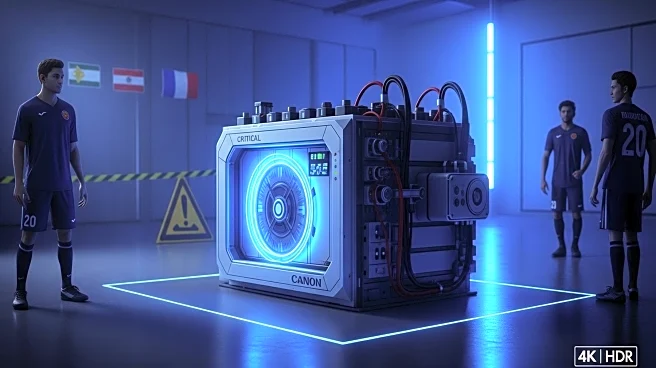What's Happening?
BYD has introduced its new 'Haohan' Battery Energy Storage System (BESS), boasting a capacity of 14.5 MWh and a 52.1% Volumetric Cell to System (VCTS) efficiency. This system significantly surpasses the capacity of competitors, such as Tesla's Megapack 3. The Haohan BESS, packaged in a 20 ft container, offers 10 MWh, which is 50% greater than top competitors. Additionally, BYD has launched the GC Flux inverter, which improves performance by 38% and features advanced grid-forming capabilities. The GC Master EMS, acting as the system's brain, supports up to 10 million data points with enhanced computing power. These advancements are expected to reduce project-level costs by 22% and overall levelized costs to $0.014 USD/kWh, making solar energy stored in batteries the least expensive form of dispatchable energy.
Why It's Important?
The introduction of BYD's Haohan BESS represents a significant leap in energy storage technology, potentially transforming the renewable energy landscape. By reducing costs and improving efficiency, this system could accelerate the transition to renewable energy sources, decrease reliance on fossil fuels, and stimulate economic growth through electrification. The system's ability to lower carbon impact aligns with emerging regulations and EU carbon border tariffs, positioning BYD as a leader in sustainable energy solutions. The advancements could also prompt countries to adopt protectionist measures, affecting global competitiveness in energy-intensive industries.
What's Next?
BYD's continued innovation in energy storage is likely to influence global energy markets, encouraging further investment in renewable technologies. The company's expansion into technology services and power transmission may enhance its market presence and drive further advancements. As BYD's energy storage systems gain recognition, they may play a crucial role in achieving global sustainability goals, particularly in developing regions where energy transformation is critical.
Beyond the Headlines
BYD's strategic use of technology transfer from its automotive division to its energy storage systems highlights the interconnectedness of its business operations. The application of automotive-grade components to stationary storage solutions enhances reliability and performance, demonstrating the potential for cross-industry innovation. This approach not only strengthens BYD's competitive edge but also sets a precedent for other companies seeking to leverage existing technologies in new markets.










